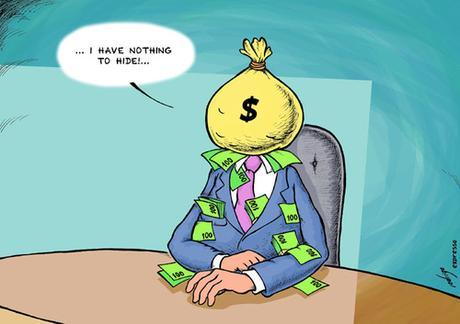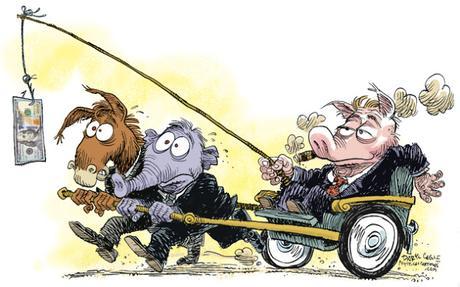 (Cartoon image is by Rodrigo at toonpool.com.)
(Cartoon image is by Rodrigo at toonpool.com.)The Center for Public Integrity says the current state of our campaign laws allows a legalized form of money laundering (and both political parties are engaging in it). They are right. Here is just a small portion of an excellent article by Carrie Levine at the Center for Public Integrity website:
In 2003, Sen. John McCain declared the federal government’s ban on “soft money” — the unlimited cash donors showered on national political parties — a “victory for the people of America and democracy.” McCain was ecstatic: Legislation he championed to reduce the influence of money in politics had just withstood a Supreme Court challenge. And the Arizona Republican prevailed after having enlisted members of both parties in his crusade. But a new Center for Public Integrity analysis of campaign finance data indicates Democrats and Republicans alike are now aggressively trafficking in a new — and perfectly legal — kind of soft money, enabled by a 2014 Supreme Court decision, the latest in a series gutting major parts of McCain’s 2002 law. The new tactic is also changing political fundamentals. In a fundraising environment that had come to be dominated by super PACs— committees that may raise and spend unlimited amounts of money to advocate for or against specific candidates — it’s helping national political parties regain some relevancy after years of declining power. It’s also reviving an era when politicians were able to directly solicit six- and seven-figure checks from donors on behalf of the political parties, raising the specter of corruption and scandals that dogged politicos during the 1990s. Here’s how this shell game works: Top donors spent the 2016 election cycle legally writing six-figure checks to so-called joint fundraising committees — committees that can dole their contributions out to multiple allies, notably including state political parties. But rather than keep all the cash, the state parties have been quickly steering the money to the national parties, taking advantage of their ability to transfer unlimited cash to their national affiliates. The joint fundraising vehicles aren’t new, but the Supreme Court’s 2014 decision to eliminate some obscure but important campaign contribution limits in McCutcheon v. Federal Election Commission had the effect of supercharging them. The 2016 election provided a first, full glimpse at what the new legal landscape would mean in reality. The result: Parties are more aggressively and successfully courting a small number of deep-pocketed donors, giving the wealthy another way to exert their ever-growing influence over politics. And the national parties, which had lost their luster as deep-pocketed donors steered their money to other vehicles, are once again flush with burgeoning amounts of cash whose origins can be difficult to divine. Foes of McCain’s effort to restrict political giving welcome the changes. But nonpartisan watchdog groups aren’t happy. The situation is “effectively a form of legalized money laundering and it is something that we’ve seen on both sides,” says Brendan Fischer of the Campaign Legal Center.
 (Cartoon image is by Daryl Cagle at cagle.com.)
(Cartoon image is by Daryl Cagle at cagle.com.)

